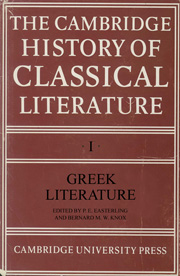Book contents
- Frontmatter
- 1 Books and readers in the Greek world
- 2 Homer
- 3 Hesiod
- 4 The epic tradition after Homer and Hesiod
- 5 Elegy and iambus
- 6 Archaic choral lyric
- 7 Monody
- 8 Choral lyric in the fifth century
- 9 Early Greek philosophy
- 10 Tragedy
- 11 The satyr play
- 12 Comedy
- 13 Historiography
- 14 Sophists and physicians of the Greek enlightenment
- 15 Plato and the Socratic work of Xenophon
- 16 Oratory
- 17 Aristotle
- 18 Hellenistic poetry
- 19 Post-Aristotelian philosophy
- 20 The literature of the Empire
- 21 Epilogue
- Appendix of authors and works
- Metrical appendix
- Works Cited in the Text
- References
13 - Historiography
Published online by Cambridge University Press: 28 March 2008
- Frontmatter
- 1 Books and readers in the Greek world
- 2 Homer
- 3 Hesiod
- 4 The epic tradition after Homer and Hesiod
- 5 Elegy and iambus
- 6 Archaic choral lyric
- 7 Monody
- 8 Choral lyric in the fifth century
- 9 Early Greek philosophy
- 10 Tragedy
- 11 The satyr play
- 12 Comedy
- 13 Historiography
- 14 Sophists and physicians of the Greek enlightenment
- 15 Plato and the Socratic work of Xenophon
- 16 Oratory
- 17 Aristotle
- 18 Hellenistic poetry
- 19 Post-Aristotelian philosophy
- 20 The literature of the Empire
- 21 Epilogue
- Appendix of authors and works
- Metrical appendix
- Works Cited in the Text
- References
Summary
HERODOTUS
Herodotus of Halicarnassus (c. 485–425 B.C.) was the founder of ancient historiography. The paradox of his life is his dual position as a prime exponent both of Ionian story telling and, despite his use of the Ionic dialect, of Attic literature. Athens of course had attracted foreigners already in the sixth century (the Samian Anacreon is an example) and continued to do so in the fifth. But in Herodotus she acquired a writer who explained her achievements and her way of life to the Greek world at large. Like Achilles, Athens had found her Homer.
Herodotus was a descendant of an aristocratic family in Halicarnassus, which appears to have had some Carian admixture. His father's name is given as Lyxus, and the poet Panyassis, author of a poem on Heracles, was a relation; both names sound Carian. We are told by the ancient tradition, but not by Herodotus himself, that he fought the local tyrant, a descendant of Queen Artemisia, celebrated for her exploits in the Persian War, was exiled, and spent some time on Samos, with which he shows in fact a fairly close acquaintance. The ancient biography is silent about his further career except for saying that he went to the Athenian colony of Thurii in southern Italy, where his tomb was shown in the market place. This tradition is reflected in our text of the Histories; according to the manuscript tradition, Herodotus describes himself as a citizen of Halicarnassus in the opening sentence, but ‘of Thurii’ is an early variant and may well have been what Herodotus wrote.
- Type
- Chapter
- Information
- The Cambridge History of Classical Literature , pp. 426 - 471Publisher: Cambridge University PressPrint publication year: 1985
References
- 1
- Cited by

